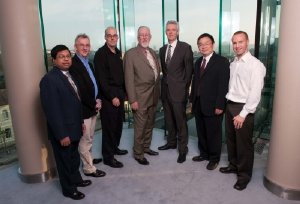Oct 13 2010
Tyndall National Institute, UCC announced today, Wednesday, at the 2010 International Power Supply on Chip Workshop in Cork, the development of a new nano-material that will dramatically reduce the operating temperature of silicon chip components and circuits, thereby enhancing the reliability and lifetime of electronics in products ranging from smart phones to automotive electronics.
Today's semiconductors are smaller, run faster, process more information and, as a result, generate more heat. Removing this heat, generated by current flowing in transistors and the connections between them, is a key challenge in today s electronics products and systems. Achieving low thermal resistance from the silicon chip to the external environment ensures a minimum increase in the temperature of the chips thereby maximizing product reliability and lifetime. As a result, the ongoing performance improvements in semiconductor devices require the continuing development of improved thermal management solutions.

"This new nanotechnology-based, Thermal Interface Material (TIM), designed and fabricated at Tyndall by Dr. Kafil M. Razeeb and his team, in collaboration with Stokes Research Institute, University of Limerick, has at least 50% better thermal performance than any material that currently exists on the market. It is a nanowire based material which reduces the thermal contact resistance between the silicon chip and the associated package or heatsink by filling in the micro-voids that are normally present due to the natural micro surface roughness between two contacting materials", said Dr. Cian Ó Math na, Head of Microsystems at Tyndall and founder of the International Power Supply on Chip Workshop (PowerSoC) which opened today in Cork.
Dr. Ó Math na went on to say, "Tyndall has leading research programmes in the development of novel miniaturised silicon devices that can be referred to as Power Supply on Chip. In recent years, the semiconductor industry has been addressing the global energy challenge by designing electronics to minimise energy use in ICT for consumer electronics, computing, telecommunications and instrumentation."
The key global players, from both industry and academia, in power supply miniaturization will spend the next few days addressing technological advances and examine closely the challenges to achieve commercialisation. The even split of industry and academic participants is deliberately targeted at ensuring a robust and collaborative dialogue.
The workshop was opened today by Damien Callaghan, Investment Director of Intel Capital and Chairman of the Advisory Board of the recently announced 500m Investment Ireland Fund. This conference is the only international form that deals with the challenges of functional integration of power delivery solutions on silicon. I am delighted to welcome all the companies and institutions to Ireland for what promises to be a dynamic exchange of the latest advances in this emerging space. Research and development over the past 10 years in Ireland through strategic funding from Enterprise Ireland, Science Foundation Ireland and the EU Framework programmes has seen institutes such as Tyndall National Institute, take the lead in developing the next generation of technologies needed to address the global energy challenge. Hosting international conferences of this nature testify to Ireland s ambition to become an Innovation Hub for the development and commercialization of advanced technologies over the coming decade.